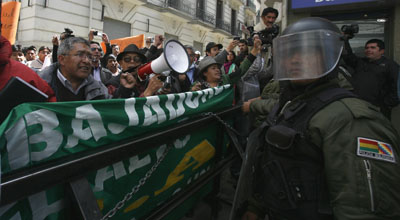Bogotá, August 30, 2012–Bolivian authorities must immediately drop a criminal complaint filed against three media outlets in connection with their coverage of a speech by President Evo Morales, the Committee to Protect Journalists said today. The news outlets are being accused of inciting racism and discrimination, according to news reports.
The government filed charges on August 21 against local dailies El Diario and Página Siete, and Agencia de Noticias Fides (ANF), Bolivia’s oldest news agency, all based in the city of La Paz, according to news reports. Authorities claimed the outlets’ coverage distorted the president’s words and sought to create a confrontation between the eastern and western parts of the country, news reports said.
In his August 15 speech, Morales discussed food security in Tiahuanacao, a town in the plateau of the Andes called the altiplano. The president said: “In the east of Bolivia, where there is production all year round, I would say that it is only a lack of will that makes us be poor or not have food. In the altiplano, it’s different. If there is frost, if there is no rain or if there is hail, then there is no food. But in the east, we only go hungry because of laziness.”
The president’s remarks sparked protests in Santa Cruz, the largest city in eastern Bolivia, according to news reports. Eastern Bolivia is a wealthier area of the country and a bastion of the political opposition, while the altiplano is made up of mostly indigenous people who strongly support Morales.
The speech was covered by ANF, fragments of which were reprinted in El Diario and Página Siete, which ran the headline: “Evo accuses people in the east of being lazy.”
“It is outrageous that the Bolivian government is pressing criminal charges against El Diario, Página Siete, and ANF for merely reporting on comments made by the president,” CPJ Senior Americas Program Coordinator Carlos Lauría said from New York. “The press should not be blamed for a controversy initiated by the president himself. The use of racism charges against the press may result in a chilling effect that will stifle debate on critical issues.”
Javier Baldiviezo, vice minister for governmental coordination, told reporters that ANF’s coverage was distorted and that in turn led to inaccurate headlines in the two newspapers. Baldiviezo also said the alleged crimes were offenses against public order and thus fell under Article 281 of the country’s criminal code, according to news reports.
Raúl Peñaranda, editor of Página Siete, told CPJ that the specified articles invoked by the government had been added to the criminal code as part of the 2010 Law Against Racism and All Other Forms of Discrimination, which aims to prevent and punish acts of racism and discrimination, but whose vague language concerned journalists and CPJ, who feared it would be used to restrict and punish journalism. Peñaranda told CPJ that this is the first time the law has been used against the media.
Peñaranda told CPJ that Página Siete had accurately reported on Morales’s remarks. “This is a lawsuit that makes no sense, and is only designed to intimidate independent media and limit freedom of expression in the country,” Peñaranda said. He also told CPJ that media offenses were supposed to be tried under the country’s rarely used Press Law, which is part of the country’s civil code.
On Thursday, members of the media in La Paz and the nearby city of El Alto clashed with police during a march to protest the government’s decision to target ANF and the two newspapers with criminal charges, according to news reports.
- For more data and analysis on Bolivia, visit CPJ’s Bolivia page here.
